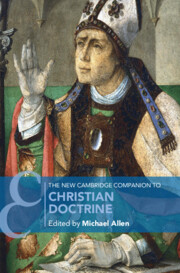Book contents
- The New Cambridge Companion to Christian Doctrine
- Cambridge Companions to Religion
- The New Cambridge Companion to Christian Doctrine
- Copyright page
- Contents
- Contributors
- Preface
- Part I Doctrines
- 1 The Triune God
- 2 Creation and Providence
- 3 Humanity
- 4 Israel
- 5 Christ
- 6 Atonement and Sin
- 7 Holy Spirit
- 8 Holy Scripture
- 9 Church and Sacraments
- 10 Eschatology
- Part II Movements
- Index
- Cambridge Companions to Religion (continued from page iii)
- References
9 - Church and Sacraments
from Part I - Doctrines
Published online by Cambridge University Press: 03 November 2022
- The New Cambridge Companion to Christian Doctrine
- Cambridge Companions to Religion
- The New Cambridge Companion to Christian Doctrine
- Copyright page
- Contents
- Contributors
- Preface
- Part I Doctrines
- 1 The Triune God
- 2 Creation and Providence
- 3 Humanity
- 4 Israel
- 5 Christ
- 6 Atonement and Sin
- 7 Holy Spirit
- 8 Holy Scripture
- 9 Church and Sacraments
- 10 Eschatology
- Part II Movements
- Index
- Cambridge Companions to Religion (continued from page iii)
- References
Summary
The church is in one sense unique among the loci of Christian doctrine: the church is both the subject of believing but also an object of belief; the church formulates and articulates doctrine while at the same time itself being an object of doctrinal reflection. It is the church universal that formulates the creeds (‘We believe’); yet part of what is believed involves certain dogmas about the church (that it is ‘one, holy, catholic, and apostolic’ and that it acknowledges ‘one baptism for the forgiveness of sins’). We call the discipline of reflecting on what we believe about the church ‘ecclesiology’. That we have beliefs about the church indicates, moreover, that while in certain ways the church shares the same forms and conditions of its empirical existence as other societies and organisations in the world (for example, it is observable and spatio-temporal), the church is also unique as an organisation by virtue of its oneness, holiness, catholicity, and apostolicity. Indeed, the church is (with Israel) a community that is different from all others in that it is a community directly created by God: the church (as with Israel) is that body of people about whom we believe God speaks the words, ‘I shall be your God and you shall be My people’ (Jer. 30:22). We have faith that the church is God’s people – faith in the invisible activity of God within the visible, empirical society of people called ‘church’.
- Type
- Chapter
- Information
- The New Cambridge Companion to Christian Doctrine , pp. 139 - 155Publisher: Cambridge University PressPrint publication year: 2022

